The George Inn was located opposite the church of St Michael & All Angels in Star Pitch. In the early 17th Century the tall gabled building was a private house known as Dunstone. The property had become an inn by 1740 when the license was transferred from another George Inn on the west side of Hawker Hill. It was originally called the George & Dragon.
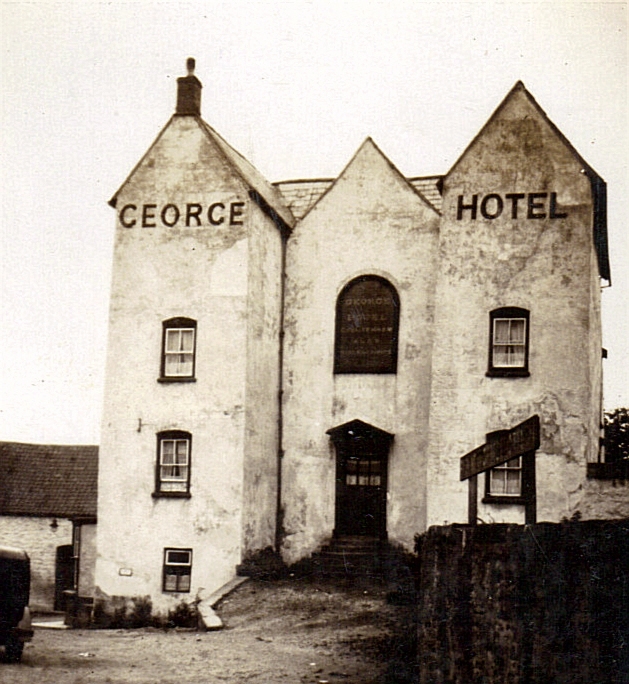
It has been suggested that the building might have once been a lead shot ammunition factory. It is thought that molten lead was dripped through purpose made holes from the third floor of the building down to troughs of water located on the ground floor. The long drop ensured that the lead balls were perfectly round.
The George was the departure point of the thrice weekly coach to Gloucester as recorded in 1837 and 1842. The George Hotel was an ale house and had an annual rateable value of £20.0s.0d. in 1891 and 1903. The nearby brewery – Francis Wintle’s Forest Steam Brewery – were the owners.
In 1907 an advertisement for the George Hotel, during the tenancy of William Watkins, gave details of ‘carriages and horses on hire’ and ‘excellent accommodation for visitors, commercials and cyclists. Within easy distance of the Speech House and Symonds Yat.’
When the George Hotel was put up for auction in 1923 as part of the tied estate of Wintle’s Forest Brewery it was described as ‘Fully licensed’. The ground floor consisted of a serving bar, bar parlour, smoke-room, public bar, kitchen, beer store and wine cellar. The George Hotel was a three-storey building comprising on the first floor ‘one large and two smaller rooms, large dining room with entrance from road, store-room and W.C. The second floor had two large and two smaller rooms and an attic on the third floor, although this was not used. The sale inventory went on to describe the outbuildings of the George Hotel which included a ‘large club room, pot house, two store rooms, loose box, skittle alley, two coach houses, stabling for nine horses with lofts over, brick built stabling for four, pig cot, etc.’
The 1923 sale inventory stated that the attic on the third floor was not in use, no doubt a contributory factor to its deterioration. Its upper storey was removed in 1947 when it was deemed to be in a dangerous structural condition. However, when demolition was taking place it was found that the structure was quite sound. Consequently, the George had an upper staircase that leads nowhere.
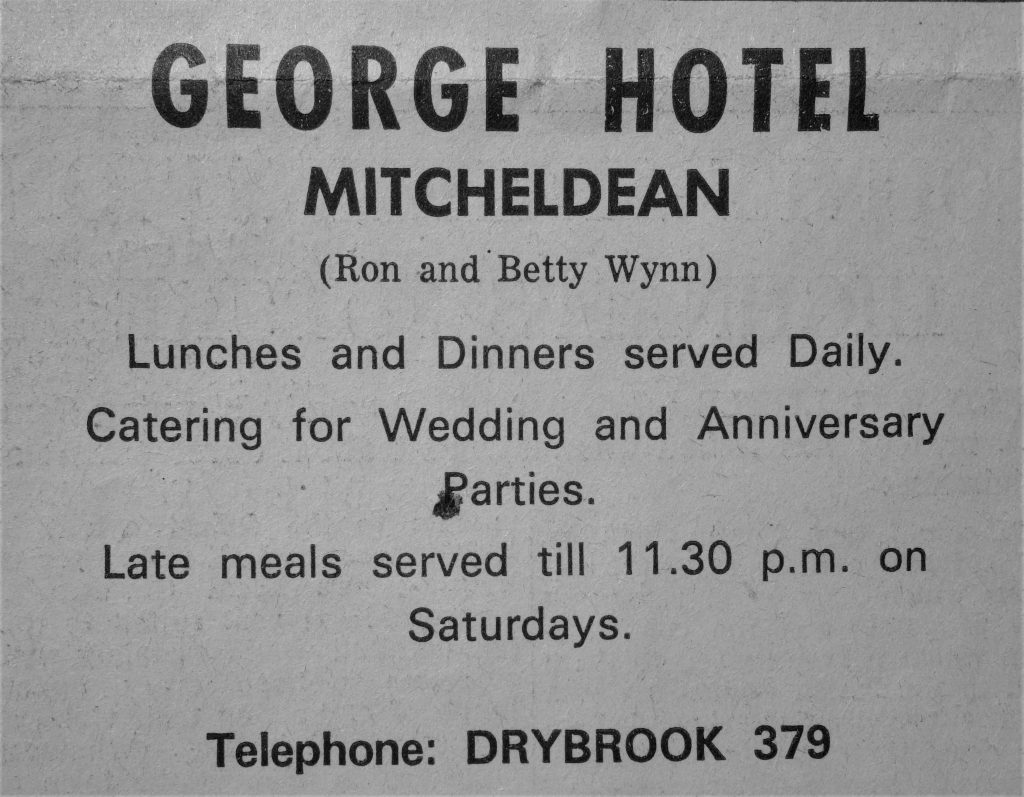
Fred Boughton, a resident of Mitcheldean, shared his memories of the village in a series of memoirs published in the Dean Forest Mercury newspaper in 1972. Fred gave the following account of the George Hotel: (DFM October 6th 1972)
“The George has a long history and dates back to the old coach days. There was room for the coach, and plenty of stables for the horses and accommodation for the passengers. Twice each week a livestock auction market was held there. On sale days the road was full of stock and the pubs full of drunks. I have seen horses, cattle, sheep, donkeys, pigs, geese and ducks all being driven through the town. On the day the animals came to town to the field behind the George, sometimes poultry, rabbits, pigeons and puppies were brought in cages carried in wheelbarrows. After the sale it was more exciting; someone would be leading a pony up the street and someone trying to lead her foal down the street. Someone would buy a bacon pig and try to drive it back home with a cord on its back leg. Sometimes the geese would not be driven and flew back to their old home. Sometimes the cattle would see their likeness in shop windows and break the glass, and little pigs would be running everywhere.”
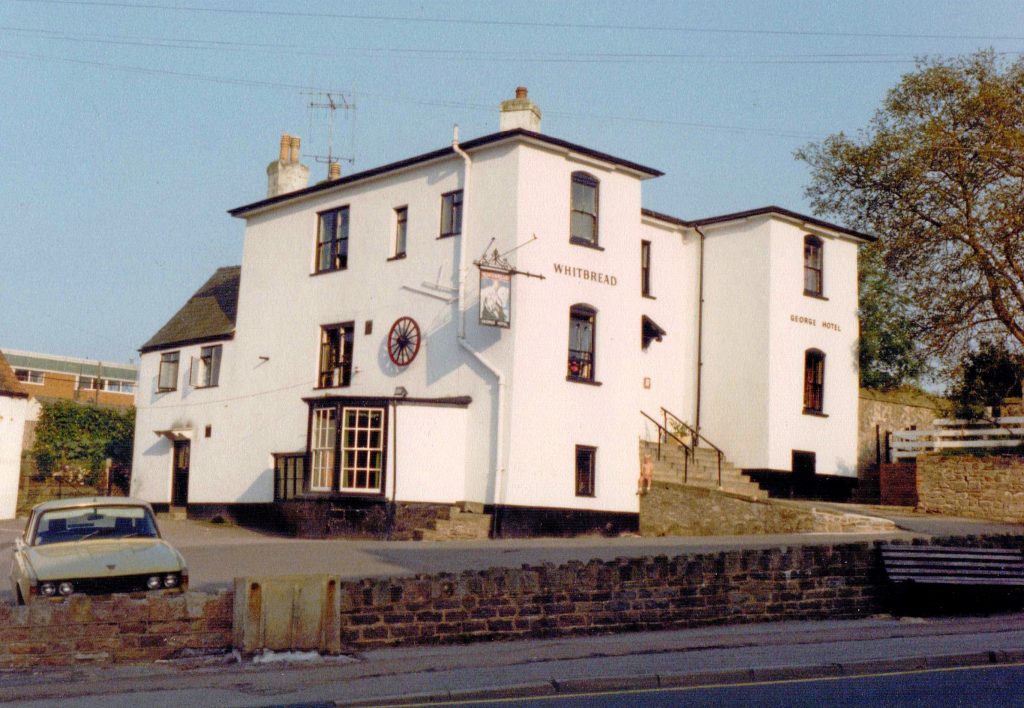
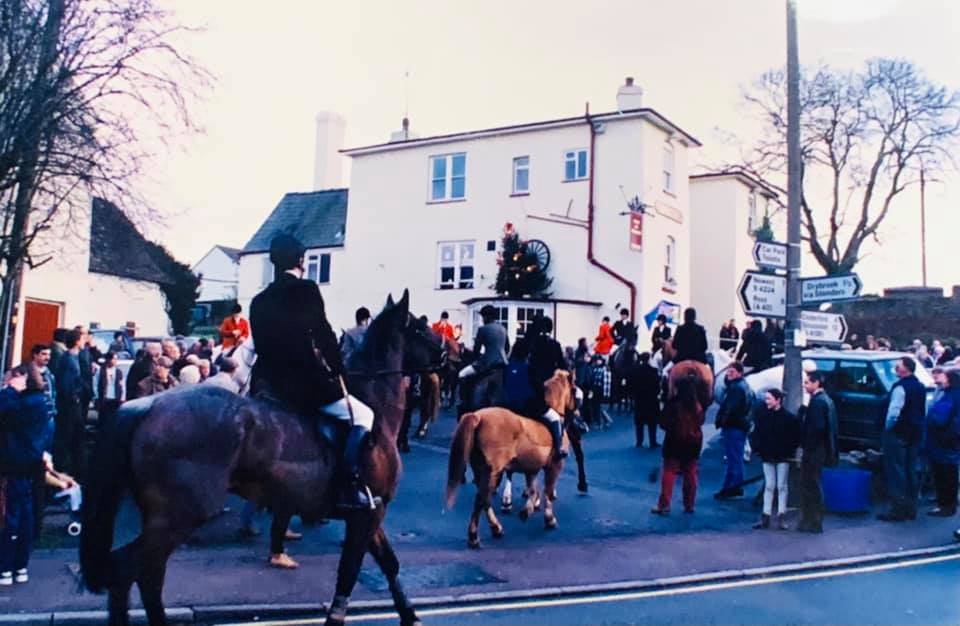
Forest of Dean and Ross on Wye Pubs. A critical guide by Jon Hurley (booklet, 1991): This old village inn overlooks the church and also enjoys a pleasant view from the public bar of sheep grazing on a green hillside. The Flowers is hoppy and rich and there are snacks, chill, curry, lasagne, the usual international selection, plus sandwiches and soup. Downstairs in the “Dragons Lair”, more substantial food is served, with a moderate wine list. The décor is modern, wooden panelling and brass bits and pieces. A bit plasticky but clean, and well run.
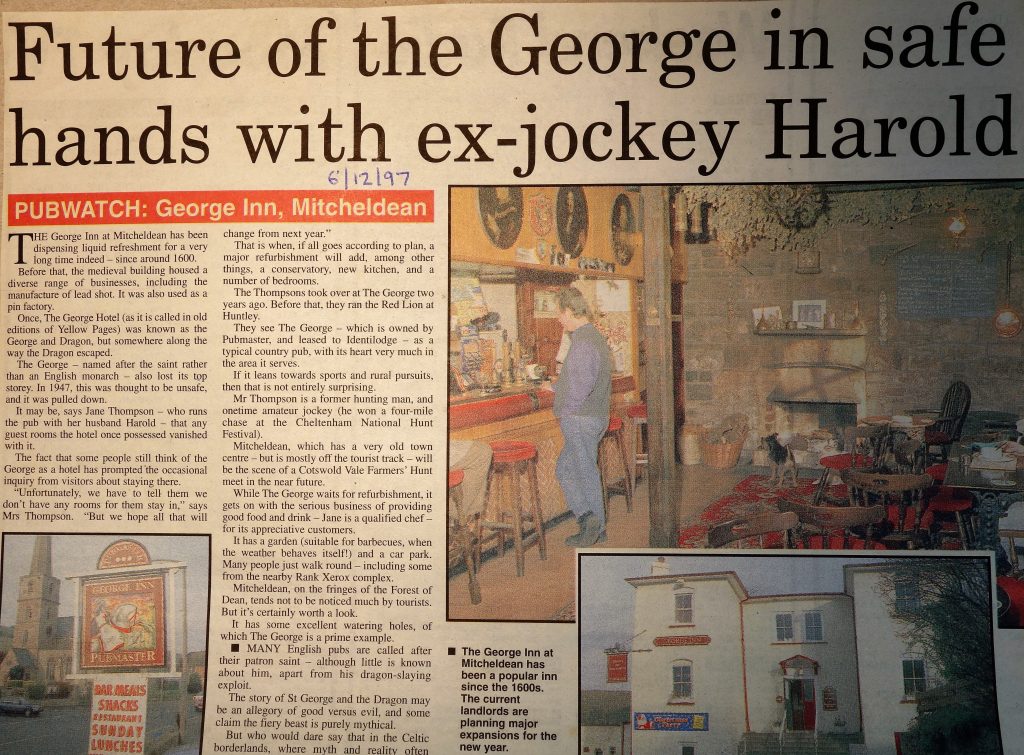
A food review in the ‘Gloucester Citizen’ in May 2002 was far from complimentary, concluding with ‘the food was unmemorable – slightly unfresh-tasting steak, anaemic looking chips and curry that tasted processed. The portions were small and the service was brusque at best. The George is a Pubmaster pub. When I got home I looked up their website. The mission statement reads: ‘To respond to our customers’ changing needs by working together with our licensees and suppliers to provide an enjoyable and rewarding experience in every one of our pubs.’ Perhaps the Pubmaster reps need to be given a map to find the Forest of Dean. The company’s intentions are good, but they certainly don’t apply to the George.’
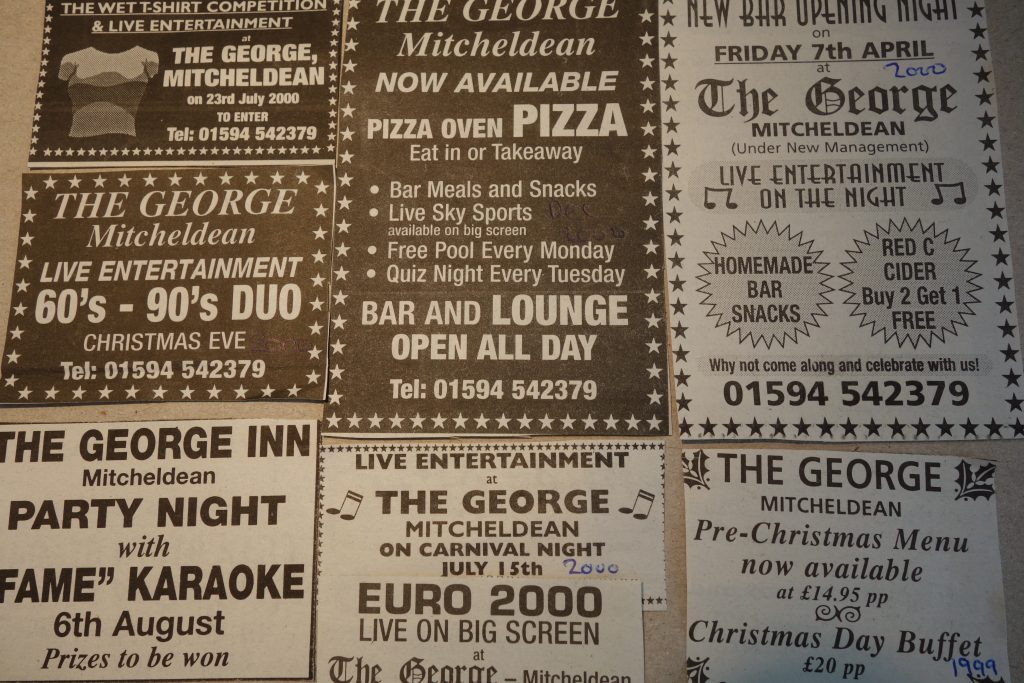
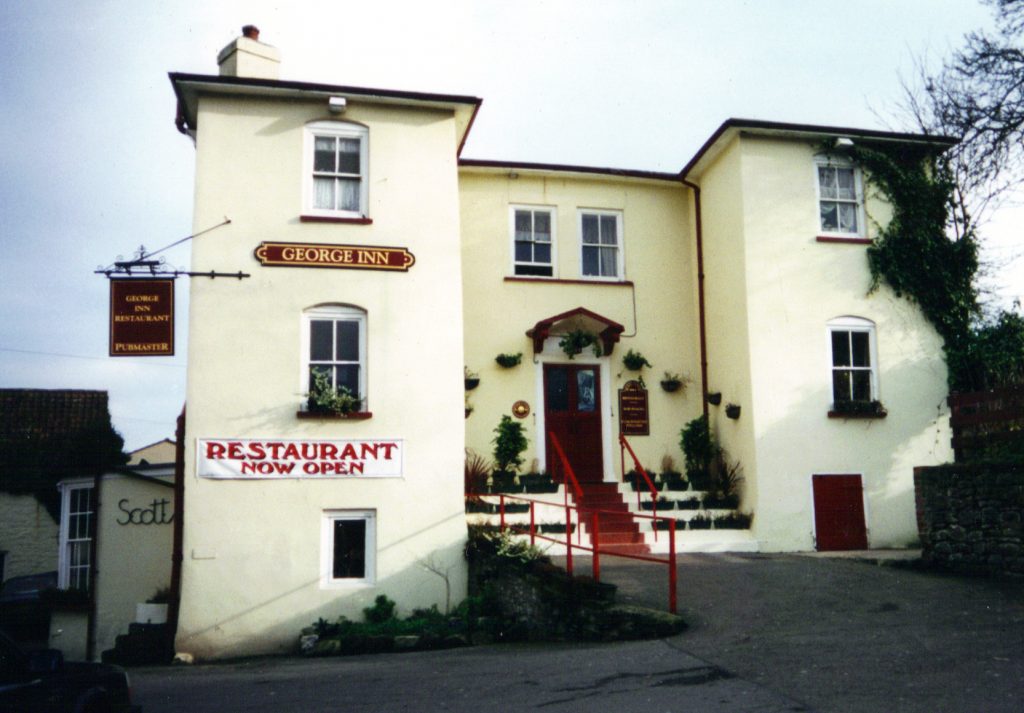
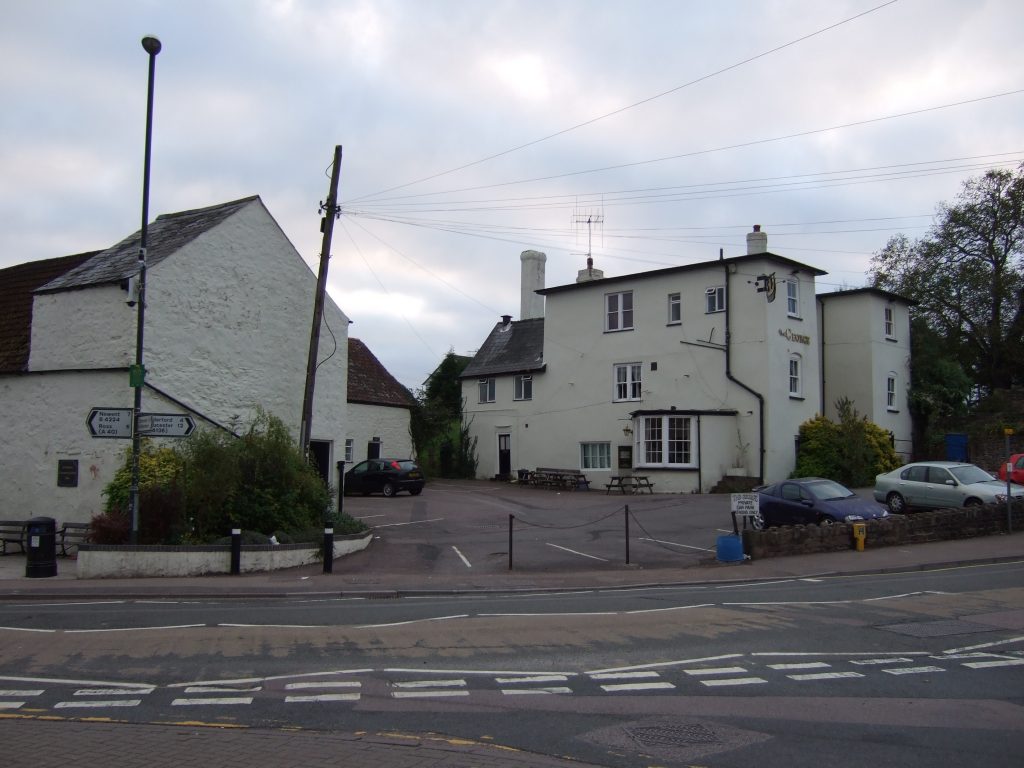
The pub closed in 2009 and for many years the building was left to deteriorate, the poor old George looking decidedly worse for wear. Developers Ferrybridge Ltd applied to Forest of Dean District Council for planning permission for the construction of 28 apartments for the over 50’s on the site of the junction of Star Pitch and the High Street. The proposal was granted and officers recommended approval, but the committee expressed some concerns and deferred a decision until the developers modified the plan to their satisfaction. Plans were put on hold in July 2015. A council spokesman said, “There were concerns with the application regarding access for emergency vehicles, parking provision and the use of materials relating to the appearance of the proposed dwelling that needs to be addressed by the applicant.” Meanwhile, the George Inn site was investigated by archaeologists who dug three trenches in which they found evidence of archaeology from both the medieval and post-medieval periods. Three outbuildings in the grounds of the George Inn were discovered to date from at least 1840 and the roof structure indicated an earlier construction date of the late 18th century. The redevelopment of the site will retain these buildings and convert them into cottages.
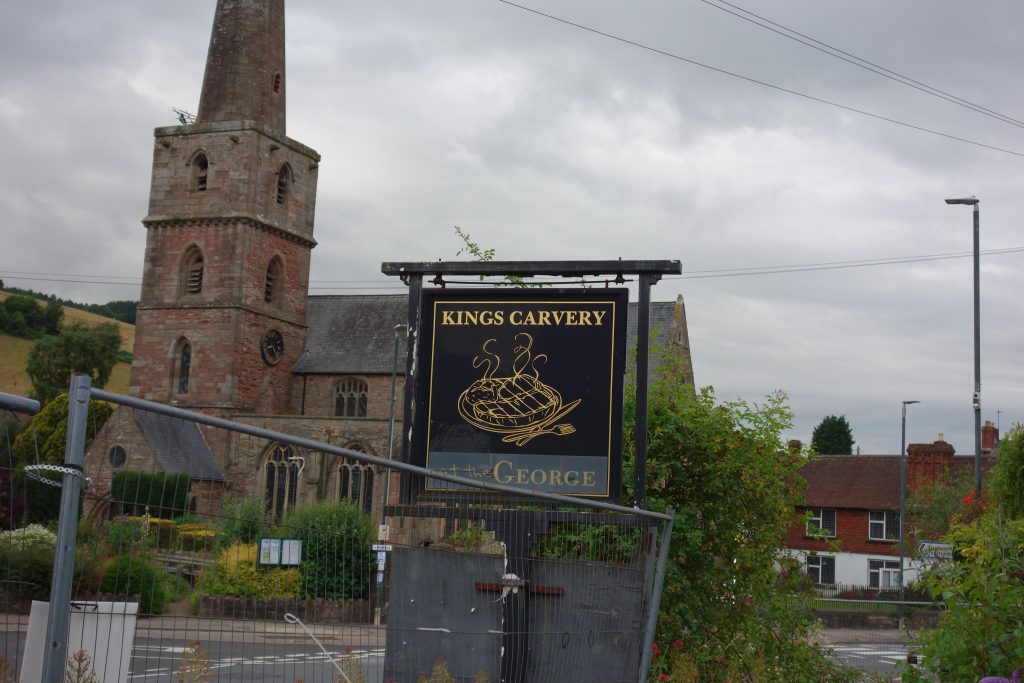
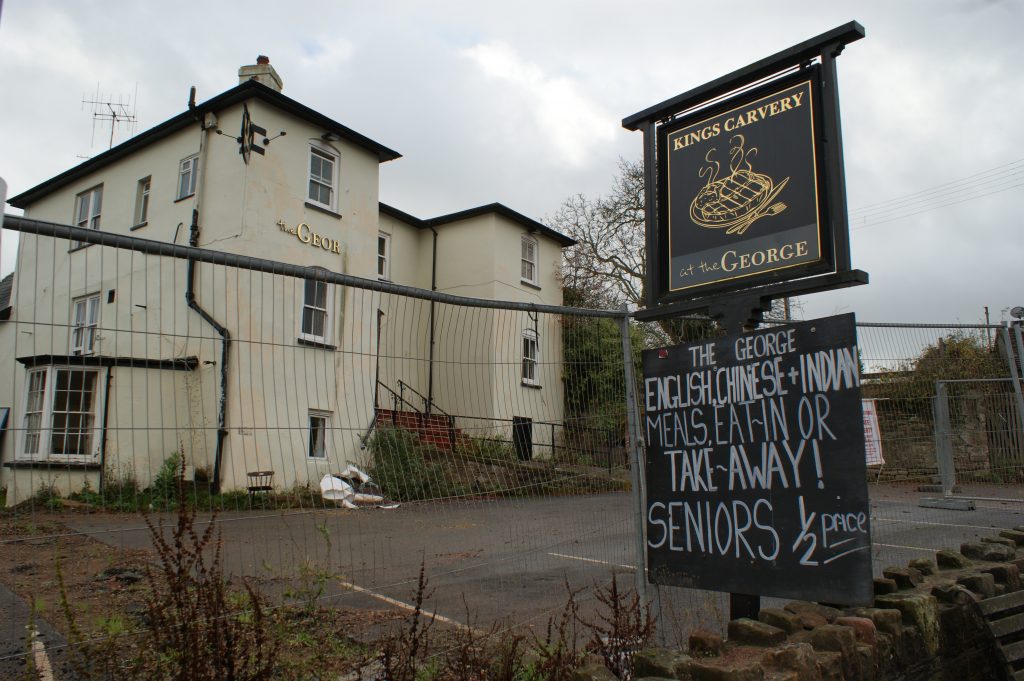
The architecture of the new-build apartments was modelled on the original design of the George Inn, the way it looked before the owners were forced to reduce the height of the building. A planning officer said, “It is considered that the proposal would preserve the character and appearance of the Conservation Area and would not result in an unacceptable adverse impact on the setting of heritage assets.”
A letter to the ‘Forester’ newspaper in August 2016 (name and address supplied) drew attention to ghostly goings-on at the George. Under the sinister headline, ‘Old Joe’s ghosts awaits the builders’, the correspondent wrote:
When the bulldozers and wrecking balls move in on the old George Hotel in Mitcheldean, in the Forest of Dean they may find resistance from an unexpected quarter. The pub, which is being knocked down to make way for an old people’s flat complex, is a traditional 17th century coaching inn.
And, though it has lain derelict for seven years, it is still said to be home to the restless spirit of trooper Joseph McGurk of the Eighth Lancers, based at Abergavenny.
Joe, as he was affectionately called by staff and regulars was a familiar presence, re-arranging bottles and glasses on their shelves. Newcomers to the pub would often gasp in amazement as bottles moved of their own accord, only to told by regulars, long inured to the phenomenon: “Oh, that’s only Old Joe, ‘e’s allus doin’ that.”
For, it was under this roof in 1833 that Trooper McGurk took his own life while being marched under escort from Abergavenny to Gloucester to face a court martial. It is believed he preferred to die by his own hand rather be sentenced to death by firing squad or transported for life to Australia, as he anticipated. McGurk’s fall from grace was set in motion, as it was for so many young soldiers, by a bottle of grog, under the influence of which he attempted to kill the sergeant who was arresting him for being drunk. In 1833 this was a serious offence and he was duly despatched to Gloucester to face a General Court Martial. The 50-mile journey was undertaken on foot over three days and, on October 13, McGurk, with his escort of a corporal and several troopers, lodged for the night at the George Hotel.
In the morning the prisoner appeared to be in good spirits, although he had earlier stated that he would either be shot by firing squad or transported for life. He also expressed that he did not care what become of him and, when breakfast was finished. the corporal gave the order to prepare for the final march to Gloucester. As they were making their final preparations to move out, McGurk suddenly dashed into another room where the soldiers had stored their loaded carbines. Before he could be stopped, McGurk grabbed a carbine, pointed the muzzle to his chest and pulled the trigger.
A newspaper report at the time said that the ball penetrated his left breast, perforating his lungs and passed out through his back, embedding itself in the wall of the room. The dying man lingered in agony for about three hours before he expired, admitting that he knew what he had done. A quickly convened inquest before Coroner J. Cooke, Esq, returned a verdict of ‘felo de se’ – or suicide. And, for the last 183 years, McGurk has been a constant presence at the pub, moving bottles around on shelves, perhaps regretting the drinking spree that led to his untimely demise. And, who knows, when the new flats are built, will the shade of Joseph McGurk continue to haunt the site, putting the wind up the new residents.
Landlords at the George Hotel include:
1830 Thomas Hale
1837,1842 Cornelius Brain (George Inn and Posting House)
1856 R. Yearsley
1869 G. Scudamore
1870,1876 Benjamin Teague (George family and commercial hotel and posting house)
1885,1891 Cornelius Baynham
1897 J.B. Coleman
1902 Frederick William Kerswell
1903 Charles English
1906 George MacIntyre Wright
1907 William Watkins
1919,1927 Mrs Bertha Eleanor Baynham
1939 Oliver Merritt Hardwick
1960’s – Ron and Betty Wynn
1995,1997 Harold and Jane Thompson
1998 Russell and Nadean Postlethwaite
2002 Wayne and Ophelia Edwards
2003 Brian Beard and Sandra Ringrose

